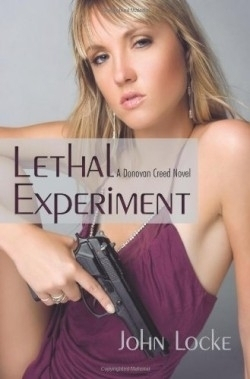Lethal Experiment
In his third Donovan Creed novel, crime novelist John Locke once again reveals his skill at creating likeable assassins and fast-moving plots that are neatly wrapped up by the end. Lethal Experiment’s “hero,” Donovan Creed, is a former CIA assassin, now working for Homeland Security, and a freelancer who offers his murderous abilities to anyone with enough money to buy him. Creed also plans executions of those who would harm his family and friends —and even longtime friends who can’t be trusted.
Symptoms of a heart attack during one double murder of innocents (part of the lethal experiment) turn out to be psychosomatic and land Creed in a psychiatrist’s office. Subsequent events make Creed ponder his career and question whether he should give up the life of a hit man. “I’d sold myself on the idea that a hit man shouldn’t ask questions,” he says. “I believed a hit man’s job was to carry out executions, not weigh the merits of them. But my conscience obviously felt different.”
Creed is a complicated man. He’s a cold-blooded assassin without regard for human life. He’s also a devoted father and a man who cares about people, such as an adopted child suffering from burns and Callie, a similarly complicated killer who works with him. Both sides of Creed are believable.
Locke capably lays out graphic scenes, handles the tender moments believably, and spices his prose with witty comments. For example, he writes that characters Victor and Hugo are mean-spirited little people who dream “of conquering the world with their midget army. If they ever succeeded it truly would be a small world, after all.”
His writing is also filled with contemporary references to current television programs, movies, and even newsmakers, as in, “she’ll be all over you like Octo-Mom in a sperm bank.”
Despite the well-planned plotline and genuine characters, there are a number punctuation and spelling distractions. Most noticeably, commas are often missing from direct address, Katharine Hepburn’s name is misspelled, and diet coke should be capitalized as a product name.
Nevertheless, Locke has created a winning character in Creed. In a time when terrorism and assassination are in the news, readers may wonder what makes CIA and Homeland Security agents tick. Locke plants possible ideas. One of his characters notes that the difference between a good man and a bad one is a matter of motivation: “Why they do what they do.” That observation may not play well in Sunday school, but it is part of the fabric of this imaginative crime novel. Readers will be glad that Locke leaves the door open for a possible sequel.
Disclosure: This article is not an endorsement, but a review. The publisher of this book provided free copies of the book and paid a small fee to have their book reviewed by a professional reviewer. Foreword Reviews and Clarion Reviews make no guarantee that the publisher will receive a positive review. Foreword Magazine, Inc. is disclosing this in accordance with the Federal Trade Commission’s 16 CFR, Part 255.

